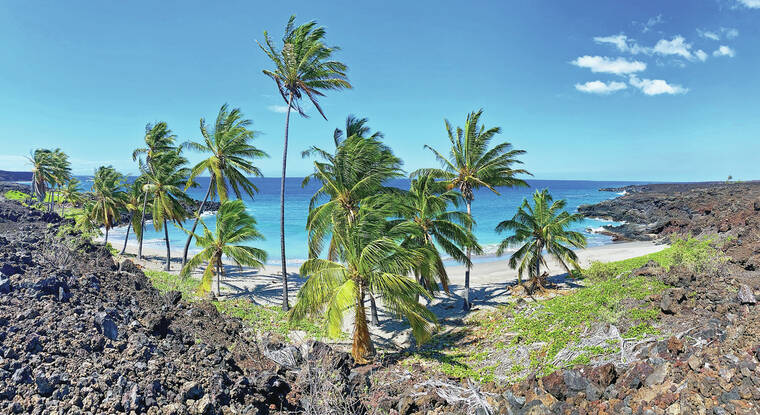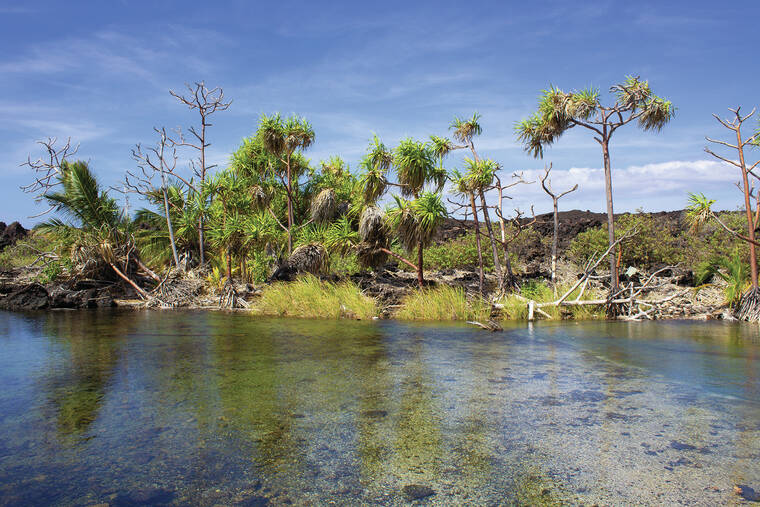Pohue Bay to be preserved: Hawaii Volcanoes National Park adds 16,000 acres with addition of Ka‘u land
Hawaii Volcanoes National Park grew by over 16,000 acres Tuesday after securing ownership of Pohue Bay in Ka‘u.
The Trust for Public Land officially transferred ownership and stewardship of Pohue Bay to the National Park Service on Tuesday, preserving the area’s unique natural and cultural resources from development. The 16,451-acre parcel, which covers an area from Mamalahoa Highway makai to the shoreline, is now part of Hawaii Volcanoes National Park.
Pohue Bay is the only white sand beach for many miles in the rugged district of Kaʻu. The bay is surrounded by undeveloped wilderness and is adjacent to Hawaii Volcanoes National Park’s Kahuku Unit, near the State Manuka Natural Area Reserve and Ka‘u Forest Reserve.
“Aloha ʻaina begins with our commitment to preserving our islands’ precious natural and cultural systems,” said Lea Hong, associate vice president, Hawaiian Islands State Director for Trust for Public Land. “We are grateful the National Park Service will steward the area with the support of the community, ensuring the history, culture and natural beauty of this place are protected for future generations.”
The trust purchased the parcel for $9.4 million via its Land and Water Conservation Fund and a donation from the Wyss Foundation. The trust is also donating an additional $800,000 to the Friends of Volcanoes National Park to support the National Park Service’s management of Pohue Bay.
Pohue Bay has been the site of several resort development proposals over the years, including the now-defunct Hawaiian Riviera Resort and even a space port. In recent years, community members identified the property as one of the highest priority acquisition/expansion areas in the Kaʻu Community Development Plan, and the acquisition of Pohue was recommended in the 2016 Hawaii Volcanoes National Park General Management Plan.
Prior the land transfer, the National Park Service met with community members in partnership with the trust and the Hawaii Alliance for Community-Based Economic Development to better understand the land’s cultural, historical and ecological significance.
Those meetings will continue over the next several months until an interim operated plan is completed. In the interim, public access to the site will be restricted to keep the public safe, as well as to protect cultural and natural resources.
Pohue Bay is home to numerous well-preserved and significant Hawaiian cultural sites, including the largest recorded abrader quarry (ancient tools used for sanding, smoothing and grinding), lava tubes, burial site, mauka-makai (mountain to sea) trails, fishing shrines, remains of once-thriving coastal villages, and petroglyphs. A well-preserved portion of the Ala Kahakai National Historic Trail or Ala Loa, an ancient coastal trail system, hugs the coastline.
The coastline is also critical habitat for federally listed endangered Hawaiian species, including the Hawaiian hawksbill turtle (honu‘ea) and Hawaiian monk seal. Rare endemic ʻopaeʻula (red shrimp) live in the area’s anchialine ponds, and the bay is often frequented by native and migratory birds, including ʻiwa (frigate bird), koaʻe kea (white tailed tropic bird), kolea (golden plover), ʻulili (wandering tattler) and ʻaukuʻu (black crowned night heron).
Currently, there are no bathroom facilities or capacity for trash removal, and emergency response is very limited. Portions of the current jeep trail and pedestrian routes to the coastline pass through private lands not managed by the park.
“In order to provide public access, the park will need to identify and establish alternative routes within the unit. The park is seeking feedback on what kinds of public access and use compatible with resource protection should be explored,” said Jessica Ferracane, public affairs specialist for Hawaii Volcanoes National Park. “The acquisition supports community sentiment captured in the Ka‘u Community Development Plan to assure that human activity does not degrade the quality of the natural and cultural landscapes of Kaʻu.”
Ferracane said the park is seeking feedback on what kind of public access and use should be explored for future management, for example, shoreline fishing, swimming, picnic and camp sites, and how best to manage use and access in order to protect the natural and cultural resources and provide for public safety.
“Pohue is an incredibly precious and culturally significant landscape that needs to be protected. We are actively seeking community feedback to get a better understanding of the natural and cultural resources in the area,” said Hawaii Volcanoes National Park Superintendent Rhonda Loh. “The park is working to develop an interim operating plan for Pohue that explores opportunities for public use compatible with resource protection. We thank the community for your patience and for the manaʻo shared so far.”
A public meeting will be held at the Ocean View Community Center from 1 to 3 p.m. Aug. 13. Additional meetings are planned and will be announced at a later date.
With the addition of the Pohue Bay parcel, Hawaii Volcanoes National Park now covers 354,460 acres, or 554 square miles, on Hawaii Island. Earlier this year, the park acquired the 2,750-acre Ala Waʻi parcel in the southwest rift zone of Kilauea in after taking control of the 1,951-acre Great Crack parcel in 2018.
The donation of the Pohue Bay parcel is the park’s largest addition since 2003, when about 156 square miles of land was incorporated.






